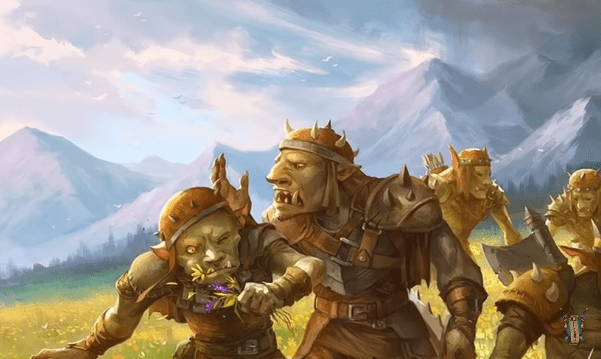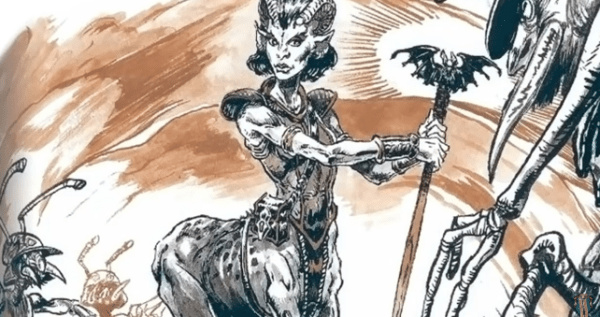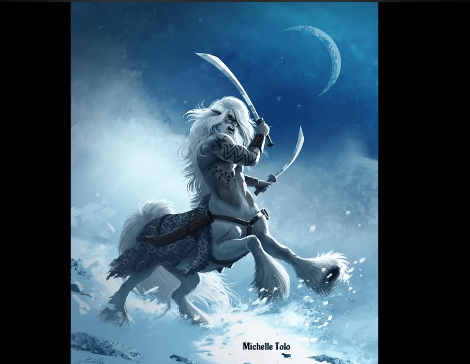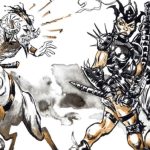The art of speech is best summed up through the multiple languages available within Dungeons and Dragons for any person to speak. From the art of speechcraft to holding a simple conversation between Player Characters or Non-Player Characters, Languages are almost impossible to have a DnD Campaign without, as communication is used so often that nothing would be possible without it.
However, some languages are better suited for certain environments and situations than others, which is the subject matter of this list of most useful languages in 5e ranked worst to best.
12. Infernal/Abyssal
Both Infernal and Abyssal have been placed in the same spot because they both hold the same Script used when it is written, along with their limited nature. Therefore, the only times that either one of these languages would be used will be if the party has encountered one or more Demons/Devils who cannot speak Common and only have this to speak.
Now, this doesn’t mean that the beings could not understand other languages such as Common or Elvish but trying to speak to them in these languages expecting a conversation will sometimes end up going nowhere. Regardless of whether they are an enemy, the party has encountered or summoned creature that brings these entities forward for the caster to use in battle. Therefore, these two languages rarely, if ever, get used in a campaign.
11. Halfling/Gnomish
In a similar notion to the previous point, Halfling and Gnomish are both in the same spot on the list due to their equal lack of usefulness, though not for the same reason as with the previous entry in the list.
Both Halfling and Gnomish are used only by the species that the languages are named after; Halflings and Gnomes. Therefore, using these languages would mainly be restricted to those who are a part of these species or have somehow managed to learn them through various means.
The lack of usefulness mainly comes from the fact that either Common or Dwarvish could be used in their place to talk to either species instead of their native language. This does make talking with these species easier, but it does make their native tongues pretty much a barely used asset, placing them on this spot in the list because of it.
10. Sylvian
As will become the case with many of the items on this list, many languages are only used in certain areas of the realms of reality within Dungeons and Dragons, with Sylvian being one such case.
For example, Sylvian is the native language of the Fey, which is normally never encountered by a party unless they either travel to the Fey Wild and encounter all manners of creatures that speak this language, or they are a druid that summons such creatures to fight for them. Either way, Fey Creatures are just as capable of learning Common as many others on this list.
So this language rarely sees usage from a Dungeon Master unless the party purposely speaks it to an NPC they have encountered that would normally have this language as their native tongue.

9. Goblin
Although it is slightly surprising that Goblinoids have their language, this is similar to many others on this list; a lack of use due to easier languages being available. Since most of the beings that can speak this language are normally hostile creatures, a player with this as a part of their Language Proficiencies is either a Goblinoid or has taken a feat from their class, race, or level-up advancement to be able to learn this language.
Even then, it would mostly be a formality over anything else, something that Goblinoids are not entirely known for having between one another or with other species outside of their own. So, if someone has this as a part of their proficiencies, it would be best to advise them to seek something else to speak besides that, if at all possible, to switch.
8. Primordial
In a somewhat similar light to the Sylvian Language, the Primordial Language is only spoken by extra-planar beings, specifically the Elementals from one of the eight Elemental Planes within Dungeons and Dragons. These Elementals could range from basic Ice, Fire, or Rock Elementals to Genasi of a given Elemental Plane that would end up in the Prime Material, though the usefulness would be limited to most likely a single aspect; combat.
Being able to speak to these beings would most likely be used simply to give commands to summoned creatures that were placed into a combat scenario and give them orders to do as their summoner demands of them. Outside of Combat, unless the party ends up in one of the Elemental Planes, they won’t speak the Primordial Language very often.

7. Draconic
Draconic is where the languages begin to broaden past simply being a one-and-done deal in terms of their usefulness, as the language has a slightly wider range of beings that can speak it, along with a slightly wider range of uses for it. To start, things such as Kobolds, Dragonborn, and full-blown Dragons can speak this language, allowing players who know this language to communicate with them without much trouble.
However, it also is capable of much more. For example, dragons are a highly dangerous and intelligent enemy to encounter during a Campaign, especially since some dragons are more than capable of causing a TPK within a campaign, which is a rather rare event. A player who can speak Draconic might want to try to talk the Dragon down and their way out of combat instead of battling a lethal creature.
This mindset can also be used with Dragonborn and Kobolds, but these creatures can be handled better in combat than when trying this against a dragon.
6. Celestial
Although it’s not common to happen from Campaign to Campaign, Celestial Beings such as Angels or the chosen Deities within a campaign setting can speak Celestial to themselves and their followers if they know it.
Holding such a language is less for combat reasons and more for passive pens. A Paladin or a Cleric who holds themselves as a zealot to a specific God would possibly hold this language at a certain extent of understanding, so then their chosen deity is capable of communicating to them without having to speak common or another tongue of theirs.
5. Giant
Half Giants tend to be seen as a slightly below-average species within a Campaign, let alone actual Giants or Ogres, three of the primary species that can actually speak this language.
Goliaths are also capable of speaking Giant, to an extent, though this is seen as a smaller understanding by some Dungeon Masters than with other species. As such, the Giant Tounge is more used, as many others have been mentioned in this list.
A primary means of communication between members of the same species or those who are trusted enough to speak the language after being taught it by whatever means they learned it.
4. Orcish
Orcs are the most common enemy seen in many Campaigns. They can be seen as moronic brutes who follow an older way of life that many different species see as brutal at best, feral and animalistic at worst.
It would make sense for such a widespread species to have its language, which to some shows that they do at least have enough intelligence to be able to speak in their tongue and, in turn, can be communicated with by those who know the language.
Like the previously mentioned Draconic Language, the Orcish Language can be used mid-fight or even before combat to talk a group of enemies (or a single enemy) down into a calmer state, allowing for peaceful conversation and, in turn, understanding between the party and the group of NPCs that are in their path. Of course, given how they are a fairly common enemy type, it would make sense that situations where Orcish is used as
1. battle commands
2. attempts at peace,
3. just basic taunts in their native tongue will be more of an occurrence as opposed to other languages.

3. Dwarvish
This language is this far down the list for two reasons: The number of its native speakers and the number of languages that use it for their Script.
First, the obvious; With how common it is to see Dwarves in any environment that the part can venture to, it is fairly understandable that the language of the dwarves is also just as common as those who speak it.
However, the second half of this point mainly has to do with their written word; Six of the Sixteen languages available throughout Dungeons and Dragons use Dwarvish as their Script for writing.
While speaking Dwarvish would not get a person too far outside those who know it or other Dwarves, writing in Dwarvish would allow a person to communicate with Orcs, Goblins, Gnomes, Giants, and Primordials, as these five groups use Dwarvish as their Script.
2. Elvish
Like the Dwarves, Elves are incredibly common throughout the travels of any Dungeons and Dragons party, so their language would be just as widespread, though for a slightly different reason than the dwarves. There are 23 different types of Elves throughout the different bits and pieces of Published Media.
That means that the Elvish language is widespread. Not just because of the common nature of finding an Elf in a Campaign but also because of just how many different variants of Elf exist throughout the entire world of DnD.
1. Common
By far the most common and used language in the entirety of Dungeons and Dragons, Common is effectively the English Language for those playing in English-speaking countries such as the United States or the United Kingdom.
As such, it would be almost impossible not to find any playable species capable of speaking Common in addition to their native tongue or extra languages gained from feats, with Humans excluded from that list.
Of course, Humans are the ones that speak this language the most, given that it is their native tongue, but so many other species have this as a part of their language proficiencies as well that it is by far the most used language in the entire game.
Final words on the most useful languages in 5e
As mentioned in the beginning portion of the List, Languages assist in a wide variety of things. Therefore, communication with these languages is a key component of any campaign, regardless of the setting or module.
Not having these languages, regardless of how common or rare it would be to find someone or something that speaks it, would make running a campaign setting practically impossible. Nothing would be able to get done if such concepts did not exist.
Regardless of what species a player chooses to play as or encounters in the future of their campaign, knowing the languages they speak can open the door to many possibilities within campaigns that would be closed without them.
